ScottD: We’re back with the second installment of our episode-by-episode deconstruction-and-discussion of the Firefly series. And we hope you’re having as much fun as we are as we watch the episodes again — or, in Tanzi’s case, for the first time, lending this exercise his fresh reactions — in an attempt to identify the elements that make this series such an enduring favorite. And where we don’t have amazing new insights, we’re at least having fun discussing our favorite bits.
Speaking of favorite bits: we sorta hope that you watch each episode before you follow our discussions. But just in case you haven’t, we try our darnedest not to provide spoilers though it sometimes kills us not to talk about a particular bit in detail. We hope you appreciate our restraint and discretion and general thoughtfulness and nobility.
ScottD: I won the toss of the three-sided coin this time, so it’s my turn to get the ball rolling for this episode.
As mentioned in the previous post, “The Train Job” was the first episode aired but was not originally intended to be the pilot. FOX wanted a punchier, “jollier” opener, so Joss Whedon and Tim Minear over a weekend knocked out this script to satisfy the network.
Tanzi: So here we see the heavy hand of Fox that ended up killing the show. In what way is this a better first episode than the pilot movie? The pilot sets up everything you need to know about the characters and why they’re together. Sure, “The Train Job” gives us more action but if I was watching this as the first episode I’d be confused about why this group of people is together.
ScottD: And just to nail down the absurdity, the “Serenity” pilot was actually the episode aired last before the show went off the air, adding insult to injury.
ScottP: While I think it’s utterly ridiculous that Fox didn’t air the pilot as the pilot, I never would’ve guessed that “The Train Job” was put together quickly to serve as a pseudo-pilot without ScottD having told me so. Watching it again with that knowledge, I can sort of see a bit of what might seem like re-hash as the characters are introduced — sort of the old Stan Lee approach to comic book writing, that every issue is somebody’s first. It’s not heavy-handed or clumsy, though, and in fact, within the first five minutes we know about Mal’s background on the losing end of the Unification War, his continued dislike of the Alliance (and willingness to get into a brawl over it), and we also get a great “first appearance” of Serenity herself.
ScottD: One of the things I like about this episode is all the daylight action with Serenity. She’s beautiful, under any light.
I said that Whedon and Minear “knocked out” this script, but that should not be interpreted as a dismissive phrase. It is actually praise, for how quickly they brought together what was essentially an entirely new pilot episode. To get it done so quickly and well, they probably incorporated some script elements they had intended to use later. And since they had already done so much of the hard work of imagining the series, putting the script together was a matter of deciding which of those elements to feature, and assembling them.
(Here’s a little insight into the writing process for y’all out there, provided free of charge. While writing does equal Butt In Chair, the actual wiggling of fingers is only the most obvious part of writing. A big part of writing is staring off into a new distance, asking mental questions like, “What If? and “What About?” and occasionally “What The–?!” Story-building is world-building, and world-building takes a lot of mental effort before it reaches the point of putting it into words.)
However they did it, Whedon and Minear managed to compress an amazing amount of material into Pilot II (which may also be pronounced: Pilot, Too.) There are bits throughout this episode that give valuable clues as to how the society in the Firefly ‘verse works, and came about in the first place.
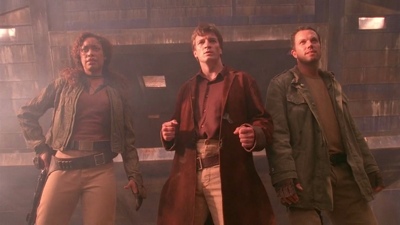
“The Train Job” has bits that reveal:
- the Chinese influence in this ‘verse
- the disparity between the central and border planets
- Mal’s concern for the average person
- that slavery is common and accepted. and
- Firefly really is a Western! Or at least has deep Western roots…
While there were quick snippets of dialogue in Chinese in the “Serenity” episode, this episode makes it clear that Chinese language and culture are integral in the Firefly ‘verse. Mal orders a drink in Chinese (Mandarin) at the bar; shortly thereafter he utters what sounds like a curse but in context when translated seems more to express eagerness to get on with a brawl: “Oh, this is a happy development.” The hanging lights, some of the signage, and a hostess all “look Chinese” to the viewer. And just to nail it down with a tidy little visual joke, as the scene starts Mal and Zoe are playing the game that we know as Chinese Checkers! (Which game was actually developed in Germany.)
The Chinese elements seem to have confused some viewers; a few have even said that it is a “distracting affectation.” Which would lead me to think that those people don’t pay much attention to current events. China is a world power now — who can say how much more influential that culture will be in our future, the future that becomes the point at which humanity flees the Earth? In numbers alone China would surely be a major player when it came time to claim their share of the new planets. It still sorta surprises me that people who have no problem with a strong Japanese influence in future fictions from Blade Runner on will balk at the idea of China having such influence.
But all of that is from my perspective of having watched the series through a dozen times, watched w/commentary, read interviews, looked at the fansites offering translations of the Chinese, etc. etc. Guys, what do you think? ScottP, you’re taking a second full voyage through; Tanzi, you’re watching each episode for the first time. How does the Chinese thing work for you?
Tanzi: My only problem with the Chinese is it wasn’t really set up as such. I was prepared for it since I’ve seen Serenity but I could see where viewers would wonder if they missed a line of dialogue, or if it was some gibberish space language. I like that they had the guts to do it though, and not do the TV thing of having a character explain it. “You’d better order your drink in Chinese since they colonized this world” or something stupid like that. So I guess I’m saying I like the way they challenged the viewer a bit but I was still thrown off a bit.
ScottP: When I first watched the series, I wasn’t thinking so much about China-as-world-power as I was the old west influence — Chinese immigrants helping to build the railroads, for instance. As someone who grew up on the TV series Kung Fu, it seemed entirely natural to me that we’d see a large Chinese presence on the frontier worlds in space, and that people around those immigrants would pick up some of the language. It never felt like an affectation to me, and makes even more sense in light of China’s position in the world today.
ScottD: Good points. Our own Old West frontier was a big cultural mix from around the world, and the Chinese were usually right there getting things built. Heck, in some parts of the Southwest a third of the cowboys were black! — not something they ever showed us in the old Westerns.
The Chinese dialogue can usually be intuited from context, but after-the-fact it is nice to have some translation resource. There are several excellent fan sites providing scene-by-scene translations, and the “official companion” books have shooting scripts that include the translation alongside each bit of Chinese.
(In behind-the-scenes discussions, several of the actors grumble about the Chinese, not the idea of it but having to deliver it. While some of the phrases are colloquial Chinese, many of them are fun things the writers came up with that, once translated, were cumbersome mouthfuls that had to be memorized phonetically.)
It’s worth noting that Chinese is not the only cultural influence — the bar contains other ethnic trappings, mostly Middle Eastern. (And if it weren’t for the Chinese dialogue, we might just think it was a theme bar.) But the general impression is that North America and China were the major forces at the time of the exodus from Earth, and these influences were transferred to humanity’s new home. (Which raises some interesting plot questions: Which cultures missed the boat? Or, if they did sail from Earth, which vessels didn’t make it to the new worlds? Which of Old Earth’s cultures aren’t represented?)
This episode also clearly establishes that the cultural conflicts are ideological and not racial. The residents of Paradiso are ethnically mixed, as are the Alliance troops on the train. Whedon doesn’t stoop to making it a racial thing. (Though there are suggestions that, in this ‘verse, there are moons that have been colonized by specific racial/ethnic/religious groups, which would have allowed for some interesting storylines.)
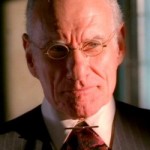 We get another cultural influence once we meet Niska, the underworld boss who has work for our crew. Nicely nastily played by veteran actor Michael Fairman (who has had roles on dozens of TV series, including The X-Files and Brisco County Jr.), Niska is proof that some of the unlovely things from Earth-That-Was made it to the new worlds.
We get another cultural influence once we meet Niska, the underworld boss who has work for our crew. Nicely nastily played by veteran actor Michael Fairman (who has had roles on dozens of TV series, including The X-Files and Brisco County Jr.), Niska is proof that some of the unlovely things from Earth-That-Was made it to the new worlds.
So now in just two episodes we have met three underworld bosses and we realize that, in the absence of strong Alliance presence, gangs and minor warlords abound. The idea that they might even represent de facto authority is reinforced by Niska’s sharp Russian Mafia business suit (a look that Badger strives to emulate.) Patience on Whitefall does not seem so concerned with appearance, but it is mighty clear that she keeps an iron hand on the reins of her little empire.
Once we get onto the train, we see indications of the lower standard of living that seems to be common on the border planets. Zoe and Mal pass through to a lower-class car — complete with a man holding a chicken, an image we might encounter on any third-world transportation today — which is actually a cattle car being used for standing-room riders. Paradiso is no paradise; there is a general air of hard work with little payoff. Everywhere on the frontier, we see indications that Alliance support is thin at best.
But then, the frontier worlds were on the losing side of a civil war. ScottP, you mentioned at the end of the last post that the Firefly ‘verse has clear parallels with the U.S. after our Civil War. Could you expand upon that?
ScottP: Not without revealing my limited knowledge of the Civil War era, unfortunately. It all seemed fairly obvious to me, though. I remember enough from school and from documentaries I’ve seen to know how things went once the dust settled, and to be quite honest, an interview with Fred Olen Ray about his western American Bandits really drove home the point. I’m not gonna try to quote anything because I don’t remember it that clearly and I can’t recall where I saw the interview — it was fairly recent, actually — but Fred talked about the way the Union not only didn’t follow through on a lot of promises of rebuilding the devastated South, but even went so far as to confiscate pretty much anything they wanted to from folks in what was the Confederacy: money, property, what have you. I think we definitely see elements of that in Firefly.
ScottD: Tanzi characterized the Alliance as “a huge bureaucracy that thinks it’s running a utopia.” In this episode we’re starting to get the idea that one of the ways they rule their utopia is to push out those who cannot fit. Some of the emigration to the border planets seems to be caused by population pressures, but one gets the impression that some people “emigrate” because they have been classified as undesirables.
Tanzi: But let’s not forget there are plenty of decent people on the frontier. People who undoubtedly want to get out from under the heavy hand of the Alliance. People like the sheriff of Paradiso, nicely played by Gregg Henry, an actor who usually plays some pretty nasty characters (The BTK Killer, for one, and a great turn as Mel Gibson’s nemesis in Payback). I was expecting the sheriff to make things hard for the crew but by the end of the episode it’s clear he’s just trying to do what’s best for his people and doesn’t really care too much for the Alliance.
ScottD: Gregg Henry’s memorable performance proves again that there are no small parts for good actors.
Tanzi, you’re right – I don’t want to seem to be characterizing all of the people on the frontier as forcibly deported criminals. (Though I fully expect that, had the series continued, we would have had a story set on a “penal moon” a la Australia.) Our own American frontier was a grand mix of people, the majority of whom were just folks looking for the opportunity to build a new life. Or escaping oppressive societies. Heck, our whole country was famously founded by folks like that; the people on our frontier were a sub-selection of them. So, the most independent-spirited people ended up there.
However, some of the people on the frontier were forced there, as “remittance men” or with service there as an alternative to prison. When Inara gets involved in cleaning up the botched caper, she tells the local authorities that Mal is her “indentured man, with three years left on his debt.” No one bats an eye at this news, or that she promises to add six months for his escape attempt. (Hey, skipping town with cash and Zoe would be enough to motivate me to try…) Throughout history, “indentured” has been legalese for “enslaved.” In frontier cultures such deals make sense; it is expensive to keep a prisoner, but an indentured convict can work off their debt. (Remember Jack Nicholson in Goin’ South?)
Not all indentured workers were convicts, though — it was a common arrangement during the colonization of America for people to indenture themselves, usually for 5-7 years, in exchange for transport from Europe, room & board, and training. After working out their time, they were free people and could pursue their life in a new land. But their contracts could be bought and sold, and until they had served out the contract they were effectively slaves.
It’s in Paradiso that we see how much Mal cares about the common person when he-
Nope, this is getting too difficult. I know we have been proceeding on the assumption/hope that folks reading this will have watched the eps first. And I do hate to provide spoilers, all unknowing. But this is just too hard, not talking about certain scenes. Guys, what do you think?
How about this: if you are following these discussions and haven’t seen the series before, stop and go and watch the eps to date right now and then come back and join the party. The series is available on DVD, Blu-Ray, Netflix Streaming, and streaming several places online, so you have no excuse. Go on, we’ll wait for you. You’re going to have a fine time.
ScottP: It is damnably hard to talk about these shows without spoilers, but I’m a staunch anti-spoilerist so as much as I’d like to interject here with a line of dialogue Mal has that speaks volumes about his character, I’ll refrain. Until a paragraph or two down. So, as the kids say — spoiler alert!
ScottD: — when Mal discovers that their theft will have a devastating effect on the people of Paradiso, you can see the oh-shit reaction on Nathan Fillion’s face. It’s a fine bit of acting, the realization kicking in and express-elevator plummeting into his gut. And we realize that Mal is not the hard-ass “brigand” (a word he uses earlier in the episode) that he likes to think he is. His ruthlessness does not extend to crying babies.
Which puts us smack-dab solid in the middle of a traditional Western trope: the paladin drifting into town and righting a wrong. Only, in this case Mal has to right the wrong that he performed in the first place! Which leads to one of the best bits from the whole series: Mal’s exchange with the sheriff as the crew heads to return the stolen medicine.
ScottP: And that’s where that line of dialogue I mentioned comes in: the Sheriff, speaking to Mal, says “A man can get a job, he might not look too close at what that job is. But a man learns all the details of a situation like ours, well then, he has a choice.” To which Mal quietly responds “I don’t believe he does.” And with those five words, we get a deep look into who Mal is. A situation like Mal and the crew have found themselves in means one thing: doing what’s right, and there’s no question about what that is, even if it means putting himself and the others in a bad spot with Niska.
ScottD: Speaking of bad spots with Niska, there’s a nice bit during the dust-up with Niska’s men. Wash gets involved in the fight not with gun or fists, but by piloting a vehicle. 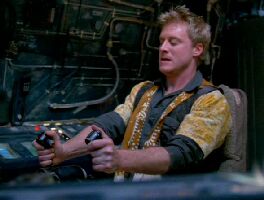 We also in this episode get to see him in his element getting Serenity to do something difficult in atmosphere, the thews and sinews standing out on his arms. And we are reminded that the jokester who plays with dinosaurs is one of the best pilots in the black. So, even though he is not one of our “warriors”, he still gets business done.
We also in this episode get to see him in his element getting Serenity to do something difficult in atmosphere, the thews and sinews standing out on his arms. And we are reminded that the jokester who plays with dinosaurs is one of the best pilots in the black. So, even though he is not one of our “warriors”, he still gets business done.
Folks out there were earlier promised discussion about Firefly-as-Western. But in the analysis this turns out to be a much larger discussion, so it looks like we are going to do a whole separate post on the nature of the space western, with the input of a variety of people. So watch for that one.
Suffice it to say for now that Firefly is a space western, one of the best examples of the genre — and its not just because of horses or sixguns or the barfight that opens this episode (with a nice twist on the guy getting thrown through the saloon window.) Westerns are set on frontiers, with all that such a setting entails, and the Firefly ‘verse has a vast and varied frontier.

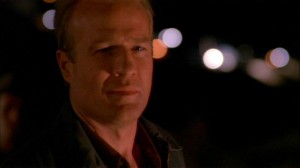
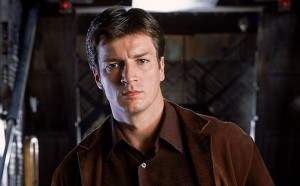
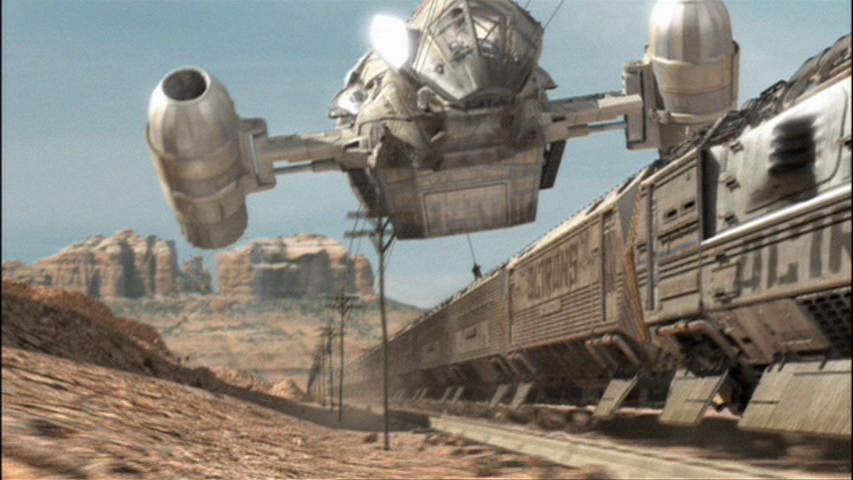
There are no comments